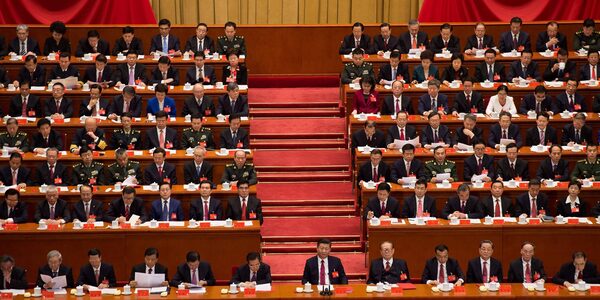
A general view shows delegates attending the closing of the 19th Communist Party Congress at the Great Hall of the People in Beijing on October 24, 2017Nicolas Asfouri/AFP / Getty Images
Xi Jinping sat before the thousands of delegates gathered for his latest coronation in Beijing, and asked for a show of hands. Did anyone oppose adding his name to the party's constitution?
The shouts rang out across the enormous Great Hall of the People:
"Meiyou" – "none."
With that, "Xi Jinping Thought on Socialism with Chinese Characteristics for a New Era" formally entered ruling party doctrine, a stroke vaulting Mr. Xi into the ranks of Communist royalty, alongside Mao Zedong and Deng Xiaoping.
China's Xi sells his vision of new socialism to the world
Far from a theoretical nicety, the change both reflects and strengthens the firm grasp Mr. Xi has attained over the direction of the world's second-largest economy.
"Xi's ability to dominate the policy-making process has just increased by a factor of 10," said Jude Blanchette, an expert in the Communist Party at the Conference Board's China Center for Economics and Business in Beijing.
Mr. Xi has sought to unify the Chinese people, military and economy toward a vision of national rejuvenation – one that promises new greatness by rejecting Western principles in favour of an authoritarian, neo-Marxist ideology under Communist rule.
"The Chinese people and the nation will, of course, embrace a bright future. And in this great era, we are full of confidence and pride," Mr. Xi said moments after the unanimous show of his support for his leadership. Delegates to the Communist Party's 19th National Congress also added Mr. Xi's "Belt and Road Initiative" to the constitution, enshrining his vision of extending China's political and development models far beyond its borders. The plan would place Beijing at the centre of new networks of trade and investment that extend as far as Europe. The concept of "supply-side reform," a description of Mr. Xi's vision for fixing domestic economic problems, is also included.
"The inclusion of Xi Jinping thought in the constitution along with the requirement to pay obeisance to him as the party core is no small feat," said Bonnie Glaser, director of the China Power Project at the Center for Strategic and International Studies "The new era is where Xi will take China in the years to come – history that has yet to be written."
But Mr. Xi has offered a clear preview, both in his first five years of rule and in his remarks, in which he called on the party to be "brave and passionate … to create achievements and make great strides to a promising future."
The Chinese president has pledged to eradicate poverty, restore environmental health and wage war on corruption at home, while elevating China's global influence abroad.
Mr. Xi called it "the historical mission of the Communist Party of China in a new era." As he spoke, former presidents Jiang Zemin and Hu Jintao looked on at the man who has now eclipsed them. Neither of the two predecessors had their names added to the constitution.
"There is enormous meaning in changing the party's constitution, since the constitution is the leading guidebook for Chinese development," Xie Chuntao, member of administrative committee at the Party School of the CPC Central Committee, told China Youth Daily.
"China is currently going through the most comprehensive revolution in its history," Wang Xinsheng, who is with the School of Marxism at Nankai University, told China National Radio.
"As a country at a critical stage of development, we can't help asking what we should do to push forward our cause of socialism with Chinese characteristics. And President Xi, the core of the Communist party, is the one who can answer this question."
In his dramatic ascension, however, Mr. Xi has taken onto himself a degree of personal authority rejected by party elders in favour of consensus rule following the vicious turbulence of the Mao era.
The extent of Mr. Xi's influence will come into sharper view on Wednesday, when the party unveils the roster of the Politburo Standing Committee, the elite inner trust that holds great power. A relatively youthful new face in the Standing Committee would signal that Mr. Xi has selected someone as his likely successor.
A Standing Committee stacked with older leaders, or perhaps one winnowed from its current seven members to five, would confirm suspicions that Mr. Xi expects to stay in power beyond the two five-year terms allowed for presidents.
Mr. Xi's more powerful positions as general secretary of the party, and chairman of the Central Military Commission, which he also now holds in addition to his leadership of a number of influential "small leading groups," carry no such restrictions.
But for at least the next five years, Mr. Xi's new pre-eminence gives him potent new authority to shape a country of 1.3 billion people after his own vision.
"Non-compliance with his signature policies – the Belt and Road Initiative and Supply Side Structural Reform – is now tantamount to betrayal after their inclusion in the Party Constitution," said Mr. Blanchette.
His success, however, will be measured in his skill in putting his new power to use.
"The moves over the past week are primarily about increasing Xi's power within the party-state bureaucracy, so we really won't know the extent of his power until we see how effectively he can initiate and oversee policy," Mr. Blanchette said.
 Nathan VanderKlippe
Nathan VanderKlippe